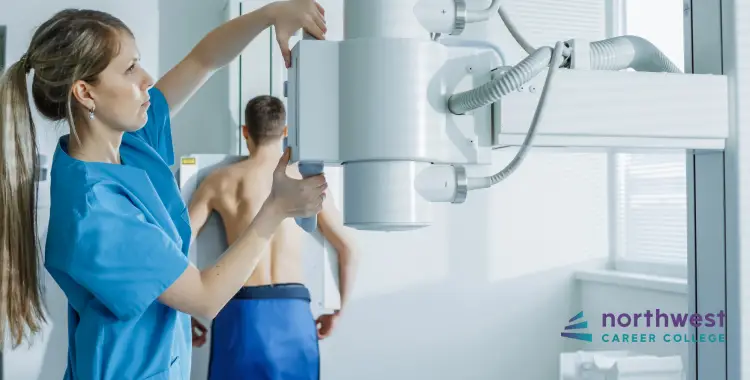The Role of Radiography Technicians in Specialized Fields Like Orthopedics and Oncology
- Radiography
-
 Authored by
David Bolshazy
Authored by
David Bolshazy
- Updated November 27, 2025
- 2.1k views
The moment the radiography technicians come into one’s mind, the thought of a noisily busy hospital where X-rays are being taken crosses the mind. Of course, these highly trained professionals are indispensable in specialized fields such as orthopedics and oncology.
In these areas, radiography technicians work hand in hand with doctors to provide detailed images needed for accurate diagnosis. If you want a career in health that combines technology, problem-solving, and patient care, radiography may be a good career path for you.

Table of Contents
What Does a Radiography Technician Do?
Radiography technicians, also called radiologic technologists, create accurate images of the internal parts of the body by using imaging equipment. These images will aid the doctor in diagnosing any type of injury or illness.
Your responsibilities include the following:
- Preparation of patients for imaging studies.
- Operating imaging machinery such as X-rays, MRI, and CT scanners.
- Capture images of high quality to ensure high-quality diagnosis.
Following safety protocols to protect patients and themselves from radiation exposure.
Radiography technicians are educated to work with advanced technology while being compassionate and understanding with patients who are anxious or uneasy during procedures.
Role of Radiography Technicians in Orthopedic Conditions
Orthopedic medicine deals with bone, joint, and muscle conditions. X-ray technicians can aid in the location and diagnosis of fractures, dislocations, and many other forms of injuries in orthopedic medicine.
For instance, a radiography technician’s work comes into play after the orthopedic clinic views a patient when a broken bone has occurred. X-rays have to be provided that confirm the ailment and, simultaneously, give the doctors the minute details needed to know precisely how many ways a treatment about the provision of a caste, surgery, or physiotherapy needs to be conducted in detail.
According to a study, an estimated 6.8 million bone fractures occur in the U.S. every year, a factor that has continued to drive the demand for skilled radiography technicians in orthopedic services.
The Oncology Role of the Radiography Technologist
Oncology is that branch of treatment that deals with diagnosing and treating cancers. In oncology, a radiography technician plays a vital role in diagnosing tumors through imaging and monitoring the outcome of treatments applied.
The technicians in oncology often deal with remarkable imaging technologies, such as CT and PET, which help them create detailed images of the body. The oncologists use these images to:
- Detect and stage cancers.
- Plan radiation therapy or surgeries.
- Track the effectiveness of healthy treatments over time.
Cancer is one of the most serious health concerns worldwide. According to the American Cancer Society, almost 2 million new cancer cases will be diagnosed in the U.S. in 2024, making the role of radiography technicians in oncology more critical than ever.
Why Specialized Fields Need Skilled Technicians
Specialized fields, such as orthopedics and oncology, need radiography technicians with technical acumen and an eye for even the minute details. Each picture taken leads the doctors to life-altering decisions for their patients.
These technicians must be technically qualified but must also communicate effectively with patients, many of whom might be in pain or anxious. This combination of compassion and precision makes the radiography technician such an asset in these fields.
Becoming a Radiography Technician
If this career sounds exciting, you’re probably wondering how to start. The typical ways of becoming a radiography technician include:
- Completion of an appropriate radiography program 1-2 years in length.
- Clinical training for hands-on experience.
- Certification by passing a certification exam, such as the one provided by the American Registry of Radiologic Technologists.
The Radiography Program at Northwest Career College will prepare you for success in this in-demand profession. The program is programmatically accredited by the Joint Review Committee on Education in Radiologic Technology (JRCERT), with its grant of accreditation valid until 2027.
Enroll now and start your rewarding journey in radiography. Please visit our website today to learn more about our program and how to get started. Your future in health begins here!


